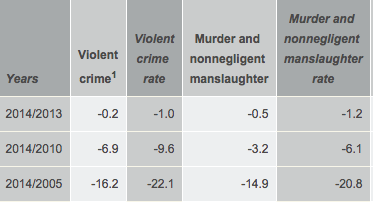Loretta Lynch’s Hot and Cold Running Data-Sharing
[See update below: Lynch says she didn’t mean how these statements came out.]
It’s bad enough that Attorney General Loretta Lynch refuses to force police to keep records on how many people they kill.
In a conversation with NBC journalist Chuck Todd on a range of criminal justice issues, Lynch said on Thursday that she does not support a federal mandate to report people killed by police.
“One of the things we are focusing on at the Department of Justice is not trying to reach down from Washington and dictate to every local department how they should handle the minutia of record keeping, but we are stressing to them that these records must be kept,” she said at the Washington Ideas Forum, hosted by AtlanticLIVE and the Aspen Institute.
It’s her reasoning I find really troubling.
Lynch said the Justice Department does “encourage” local departments to maintain records on police shootings but that improving police-community relations is more important. She noted that the small size of the average police department could make record-keeping difficult.
“The statistics are important, but the real issues are: ‘what steps are we all taking to connect communities … with police and back with government?’” she said.
It’s all well and good to say communities and their cops just need to get along.
But cops are claiming a Ferguson Effect that statistically doesn’t exist and the NYT is reprinting the claim only because the cops say so.
Here’s what the crime story said: “Among some experts and rank-and-file officers, the notion that less aggressive policing has emboldened criminals — known as the “Ferguson effect” in some circles — is a popular theory for the uptick in violence.” A paragraph later, the story continues: “Others doubt the theory or say data has not emerged to prove it.” Two experts are quoted, and the story moves on from there.
Bill Michtom of Portland, Ore., wrote to me about it, calling it a “classic example of false equivalence.” Ta-Nehisi Coates called the suggestion of a Ferguson effect “utterly baseless” in a piece for The Atlantic, noting that one of the experts quoted said that the rise in violent crime in St. Louis had begun before the large protests last year over a white police officer’s fatal shooting of an unarmed black teenager.
One of the story’s reporters, Monica Davey, and the national editor, Alison Mitchell, strongly disagree that this is false equivalence or that it was misleading to readers. In fact, they told me, it would be wrong of The Times not to report something that some police officers are identifying as part of their mind-set.
Ms. Davey, who agrees that false balance is infuriating and must be avoided, said in an email that this example simply doesn’t fit the description. For one thing, she said, there is no established truth here: “The question about the validity of this theory simply has not been definitively answered in the way that the earth’s shape has.” And, she said, “police officers must be given some credence in assessing whether they themselves feel that they are behaving differently now — the essence of what some of them have called the ‘Ferguson effect.’ ”
Or, as Ms. Mitchell puts it: “We have the police suggesting that police are pulling back — should we not report that?”
My view is that the introduction of this explosive idea didn’t serve readers well because, in this context, it was mentioned briefly, sourced vaguely, and then countered by disagreement. If police officers are indeed pulling back from their duties, and are willing to be identified and quoted, and if there’s evidence to back it up, that would be worth a full exploration in a separate article. But this glancing treatment could easily have left readers baffled, at the very least.
Things aren’t going to improve so long as cops can just make shit up, in spite of data to the contrary.
Just as importantly, since 9/11, the mandate throughout the Federal government — and especially for FBI — has been to share information promiscuously, including down to local police departments. Some of that information includes untested leads; some of it includes cyber and terrorist threat assessments.
If Lynch is telling us these local police departments don’t have the ability to handle reporting back and forth from the federal government, than the rest of the info sharing should stop too, because it could violate Americans’ privacy and/or expose intelligence streams.
But we all know that’s not going to happen.
Which means Lynch is supporting an asymmetrical reporting system that can’t be used for oversight of the larger system.
Update: Lynch says her statements last week weren’t what she was trying to say.
The point I was trying to make at that conference related to our overall view of how we deal with police departments as part of our practice of enforcing consent decrees, or working with them and I was trying to make the point that we also have to focus on building community trust which is a very individual – very local – practice. Unfortunately, my comments gave the misperception that we were changing our view in some way about the importance of this data – nothing could be further from the truth. This data is not only vital – we are working closely with law enforcement to develop national consistent standards for collecting this kind of information.
More from her statement:
“The department’s position and the administration’s position has consistently been that we need to have national, consistent data,” said Attorney General Lynch. “This information is useful because it helps us see trends, it helps us promote accountability and transparency,” said Attorney General Lynch. “We’re also going further in developing standards for publishing information about deaths in custody as well, because transparency and accountability are helped by this kind of national data.”

